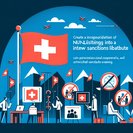
ZÜRICH – Two weeks after federal authorities quietly authorised emergency medical evacuations from Gaza, the first detailed account emerged on 8 November 2025 when the newspaper *Blick* published the diary of 11-year-old Layla*, airlifted by Rega jet to Zürich’s Kinderspital. The article has thrust Switzerland’s little-known humanitarian-visa channel back into the political spotlight and triggered fresh questions from employers whose staff seek to sponsor relatives from conflict zones.
1. The State Secretariat for Migration (SEM) confirmed that 20 Palestinian minors have been granted so-called ‘L visas for humanitarian reasons’ since late October. The visas allow a 90-day stay, renewable once, and must be accompanied by a cantonal guarantee that medical costs are covered. In Layla’s case, Zürich Canton and a private foundation split the CHF 350,000 budget for acute treatment and rehabilitation.
2. Critics in Parliament’s Security Policy Committee say the operation, conducted with minimal publicity, bypassed normal consultation. Supporters argue that Article 36 of the Foreign Nationals and Integration Act explicitly empowers the Federal Council to issue humanitarian visas in «situations of particular distress», mirroring the 2022 programme for Ukrainian burn victims.
![Switzerland receives badly injured Gaza children on special humanitarian visas, reigniting debate over emergency admissions]()
3. For global-mobility teams the episode underscores how ad-hoc humanitarian admissions interact with regular family-reunification quotas. The SEM reiterated on Saturday that L-visa holders are not counted against cantonal immigration ceilings and may not take up employment. However, multinational companies that second staff to Switzerland have already begun asking whether the same pathway could be used for dependants stranded in war zones such as Sudan. The official answer: only if a Swiss hospital certifies that life-saving treatment is unavailable locally.
4. Practical guidance: sponsors must submit proof of financing, evidence of the medical emergency and a return-flight guarantee. Processing is centralised in Bern and can, in theory, be completed within 48 hours – but capacity is constrained. Mobility advisers should therefore warn assignees that the scheme is discretionary, case-by-case and cannot be relied upon for large numbers.
Layla’s story humanises a bureaucratic mechanism usually discussed only in footnotes. Whether the political backlash will tighten or codify the rules remains to be seen, but for now Switzerland continues to occupy a middle ground between ad-hoc mercy flights and rigid visa statutes.
1. The State Secretariat for Migration (SEM) confirmed that 20 Palestinian minors have been granted so-called ‘L visas for humanitarian reasons’ since late October. The visas allow a 90-day stay, renewable once, and must be accompanied by a cantonal guarantee that medical costs are covered. In Layla’s case, Zürich Canton and a private foundation split the CHF 350,000 budget for acute treatment and rehabilitation.
2. Critics in Parliament’s Security Policy Committee say the operation, conducted with minimal publicity, bypassed normal consultation. Supporters argue that Article 36 of the Foreign Nationals and Integration Act explicitly empowers the Federal Council to issue humanitarian visas in «situations of particular distress», mirroring the 2022 programme for Ukrainian burn victims.

3. For global-mobility teams the episode underscores how ad-hoc humanitarian admissions interact with regular family-reunification quotas. The SEM reiterated on Saturday that L-visa holders are not counted against cantonal immigration ceilings and may not take up employment. However, multinational companies that second staff to Switzerland have already begun asking whether the same pathway could be used for dependants stranded in war zones such as Sudan. The official answer: only if a Swiss hospital certifies that life-saving treatment is unavailable locally.
4. Practical guidance: sponsors must submit proof of financing, evidence of the medical emergency and a return-flight guarantee. Processing is centralised in Bern and can, in theory, be completed within 48 hours – but capacity is constrained. Mobility advisers should therefore warn assignees that the scheme is discretionary, case-by-case and cannot be relied upon for large numbers.
Layla’s story humanises a bureaucratic mechanism usually discussed only in footnotes. Whether the political backlash will tighten or codify the rules remains to be seen, but for now Switzerland continues to occupy a middle ground between ad-hoc mercy flights and rigid visa statutes.










